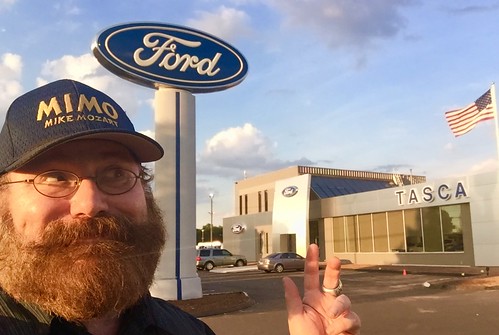Ford says it has a ‘Skunk Works’ team trying to make lower-cost EVs
Ford #Ford

Ford says it has a top-secret, high-powered team working to design its future electric vehicles. It’s part of a quest to compete profitably against Tesla and lower cost EV makers from China.
People in the market for an electric luxury vehicle can find plenty of options to choose from. That’s because EV technology, particularly batteries, is expensive so it’s easier for automakers to earn a profit on an Audi, Mercedes or Cadillac because people are used to paying more for those luxury car brands. Even among mainstream auto brands, like Ford, EVs tend to cost more. Take the Mustang Mach-E, for instance, with prices starting around $45,000.
Those prices are starting to hamper sales. In the US, EV sales growth has slowed and cost is seen as a major reason. Electric vehicle sales increased by 40% in the fourth quarter of 2023 compared to the same period in 2022, according to Cox Automotive. While that’s strong growth, it was less than the 49% growth in the quarter before or the 52% year-over-year growth seen in the same period the year before.
In a study released late last year by S&P Global Mobility, almost half of people surveyed globally thought EV prices were too high.
“Pricing is still very much the biggest barrier to electric vehicles,” said Yanina Mills, senior technical research analyst at S&P Global Mobility, in an announcement about the survey.
Accordingly, Ford has had a team working on engineering for inexpensive electric vehicles for two years, chief executive Jim Farley said on a recent investor call.
“We developed a super-talented ‘Skunk Works’ team to create a low-cost EV platform,” Farley said. “It was a small group, small team, some of the best EV engineers in the world, and it was separate from the Ford mothership.”
Word of the development came as Ford announced improved earnings last year, despite a United Auto Workers strike. Ford also announced a new dividend for shareholders. Ford stock has risen more than 6% since then.
Story continues
Skunk Works history
“Skunk Works” is a reference to defense contractor Lockheed Martin’s Skunk Works division, which has been responsible for some of the most advanced – and secretive – aircraft in history like twin-boomed P38 Lightning from World War II, the SR-71 Blackbird spy plane and the original stealth jet, the F-117 Nighthawk. By dubbing its own operation as a “Skunk Works” team, Ford is seeking to put the scale of the matter front-and-center.
Ford will need cheaper EVs to compete against vehicles from Chinese automakers, and from Tesla Farley said. Even outside Asia, Chinese-built EVS are making major market in-roads in Europe. Tesla is also planning a compact crossover vehicle that’s targeted to cost around $25,000, Reuters has reported. But neither a Chinese-built EV nor a cheap Tesla are thought to be close to hitting the American market.
In the case of Ford’s Skunk Works, the team has developed a vehicle engineering design that can be used to create a wide variety of electric vehicles, Farley indicated. In that sense, it is similar to GM’s Ultium platform or Hyundai Motor Group’s E-GMP platform, both of which are the basis of a number of electric vehicles of a variety of different sizes and prices.
At least some of these vehicles will be able to use the sort of software and services Ford currently offers to its commercial vehicle customers through its Ford Pro division, Farley said. Those sorts of services can be major sources of revenue for carmakers, as they keep up a steady flow of cash from customers making monthly payments directly to the manufacturer beyond the one-time initial purchase of the vehicle.
A Ford spokesperson declined to provide any further details about the development team or the engineering platform they have developed. The team is being led by Alan Clarke, an electric vehicle engineer hired by Ford in 2022 after he had spent 12 years at Tesla, people at Ford confirmed.
A quest for lower-priced EVs
Farley also said Ford’s customers have shown they are not willing to pay greatly higher prices for electric vehicles. Ford recently announced plans to scale back production capacity for its electric truck, the F-150 Lightning, and for an EV battery plant that’s currently under construction.
Ford once had trouble keeping up with demand for the Lightning. Now that the market for EVS has moved on from enthusiastic early adopters – those willing to accept inconvenience and higher prices to have the latest technology – to those Farley referred to as the “early majority,” these new customers are considering their purchases more carefully.
Ford now seems focused on the concept of crossing the chasm between early adopters and broader consumers. And it’s banking on the broader market demanding lower prices. The shift can be seen in Ford’s own sales and financial results in the US market, Farley said.
“EV total revenue was down in the second half of last year versus [the second quarter. If you look at unit volumes, they were up,” Farley said. “That is a really important insight we learned in being a first mover.”
For more CNN news and newsletters create an account at CNN.com